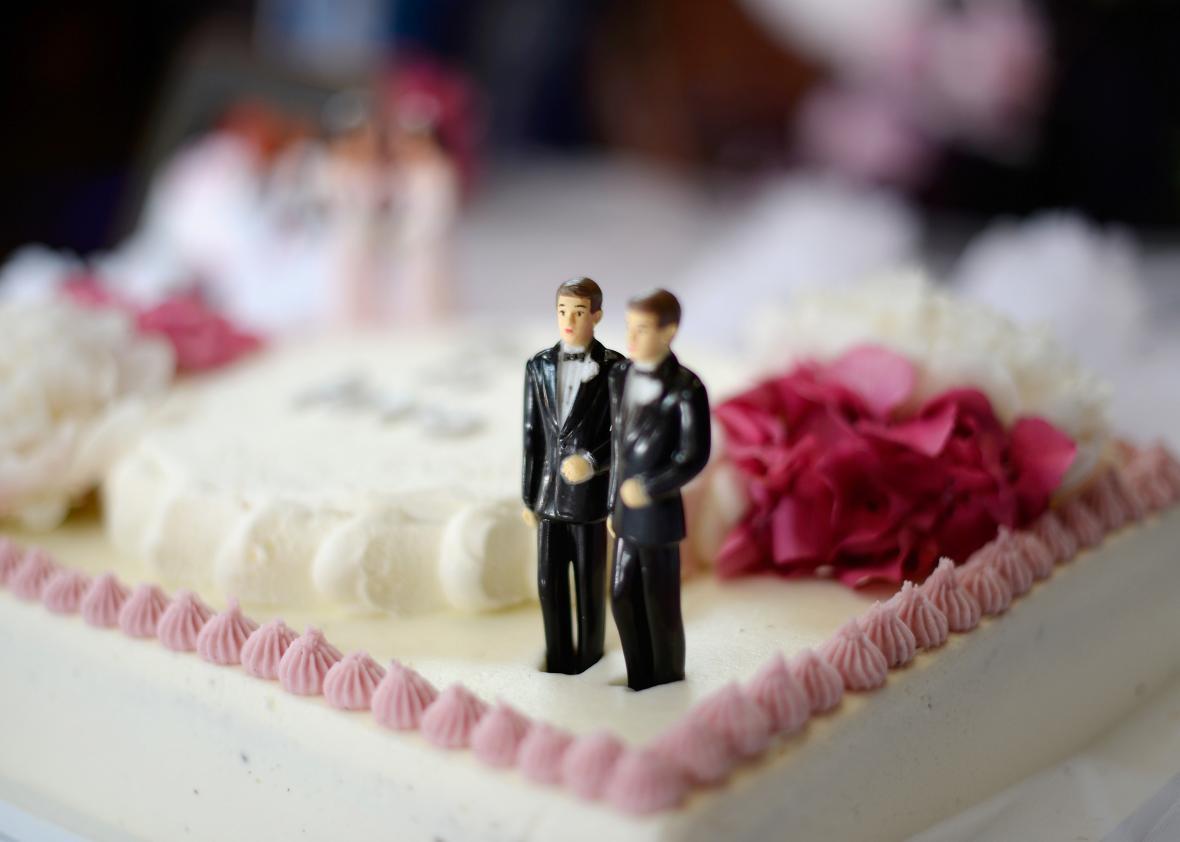On Thursday, the Colorado Court of Appeals issued a landmark decision holding that a bakery violated state nondiscrimination law by refusing to serve a gay couple. That ruling is no surprise: Courts and commissions in New Mexico, Oregon, Washington, and New York have found that sexual orientation nondiscrimination laws prevent businesses from turning away same-sex couples. Still, the Colorado ruling is notable for the lucidity and vehemence with which it rejects the feeble claims that bakers and florists often make to justify their discrimination. Here are the court’s three strongest and smartest conclusions.
1. Yes, discriminating against a same-sex couple qualifies as sexual orientation discrimination.
You’d think it would be obvious that when a storeowner refuses to serve a same-sex couple, he’s discriminating on the basis of their sexual orientation. After all, courts universally agree that discrimination against interracial couples is discrimination on the basis of race. But Masterpiece Cakeshop disagreed, insisting that it turned away a gay couple because it disapproved of their impending same-sex union, not their orientation. (At the time of the incident, same-sex marriage was illegal in Colorado.)
The court of appeals rightly laughed off this dubious logic. Under Colorado law, the court held, refusing to serve gay customers who plan to celebrate their union qualifies as discrimination “because of” sexual orientation. Engaging in a same-sex commitment ceremony may technically be “conduct,” not “status,” but the Supreme Court has stated that it “decline[s] to distinguish between status and conduct” in the case of homosexuality. Committing to a same-sex partner, like engaging in same-sex intimacy, is fundamentally intertwined with the gay or bisexual identity. Thus, the Colorado court explained, the “conduct” of solemnizing a same-sex union “is so closely correlated with the status” of sexual orientation that to discriminate against one is to discriminate against the other.
2. Baking a cake is not “inherently expressive.”
Certain aspects of cake-making are undoubtedly expressive—like, for instance, writing a message in frosting atop a cake. However, the physical act of baking (and selling) a cake is not in itself expressive conduct. Other courts have gotten lost in the weeds trying to state this commonsense point as a legal conclusion.
Not the Colorado Court of Appeals. Baking and selling cakes isn’t expressive, the court wrote, because it doesn’t “convey a message.” Unlike flag-burning (which conveys an anti-American message) or cross-burning (which conveys a racist message), baking a cake expresses … nothing. Simply making a cake to sell to a gay couple, the court held, does not constitute a “particularized message celebrating same-sex marriage.” When bakers bake a cake, in other words, they’re filling an order, not declaring their support of the cake’s recipient. The sale of a wedding cake to a gay couple doesn’t convey “a celebratory message about same-sex marriage” any more than the sale of a cake to a bar mitzvah party conveys a celebratory message about Judaism.
3. Nondiscrimination laws don’t violate your free exercise of religion, no matter how much you despise same-sex marriage.
Masterpiece’s weakest claim is also the one that gets the most play among the religious right: It argues that serving gay couples would violate its free exercise of religion, which is protected by the First Amendment. Unfortunately for Masterpiece, the Supreme Court has held that a law that prohibits certain conduct comports with the Free Exercise Clause so long as it is neutral (not directed at a certain religion) and generally applicable (applies to all religions evenly). Put simply, a law not motivated by animus toward a particular religion or its practices will probably pass Free Exercise muster.
As much as anti-gay conservatives enjoy citing nondiscrimination laws as proof of Christian persecution, no intelligent observer could possibly conclude that Colorado’s law is motivated by anti-Christian animus. As the Colorado court notes, the law in question is a classic nondiscrimination measure, designed to prevent places of public accommodation from denying service based on customers’ identity. It does not single out Christian bakeries for disfavored treatment; Christian bakers need only comply with the rules that all other bakers follow. If they dislike these rules, then perhaps they should not run a business that purports to be open to the public.
The Colorado Court of Appeals’ ruling, of course, will only fan the flames of the Christian persecution complex on the far right. But for the more tolerant chunk of American society, the decision is a heartening affirmation of the basic principle animating nondiscrimination laws: In a country that values liberty, no person should fear he’ll be turned away from a place of business because of who he is.
